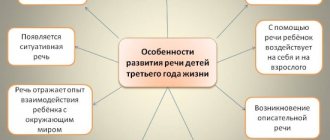Many parents do not notice that their child speaks poorly, because they simply do not know how speech should develop in children of a certain age. The child talks, communicates, asks questions, but parents often don’t think about HOW he pronounces words (rearranges syllables, replaces sounds). Parents often believe that these problems will go away on their own and their child will eventually catch up with his peers. As a rule, they are wrong.
If a child aged 3-4 years speaks incorrectly or does not speak at all, then you need to sound the alarm.
From the age of one to 5-6 years, children begin to develop sound pronunciation. At first, the child “distorts” words, distorts them, but as he masters speech sounds, the pronunciation of words becomes more and more precise and gradually approaches the norm.
In the first years of life, due to the “immaturity” of the speech organs, the child can correctly pronounce only the simplest sounds in articulation: A, O, E, M, B, P. From these, the child makes up the first words: dad, mom, baba. Somewhat later, other sounds are acquired: I, Y, U, F, V, T, G, K, D, N, X, Y. The child masters these sounds in the period from one to three years. Consonant sounds that are more complex in articulation (S, Z, Ts, Sh, Shch, Zh, Ch) appear only at the age of 3 to 5 years. Before this, they are either completely absent from children’s speech or are replaced by simpler sounds. The most complex sounds (R, L) appear in most children between 5 and 6 years of age.
The formation of sound pronunciation normally ends by 5-6 years. Consequently, no normally developing child should come to school with defects in the pronunciation of sounds. The “delay” in itself in the development of sound pronunciation indicates the presence of a speech pathology in the child.
What is ZPRR
Delayed mental speech development of a child is a disease in which he lags behind age norms in his psycho-emotional development. Characterized by speech dysfunction, behavioral disorders, emotional disorders - rigidity or lability. Some children also experience motor dysfunction.
Develops against the background of diseases of the brain or central nervous system. On the one hand, a special neurological status can cause a delay in the development of the psyche and speech, on the other hand, the pathology itself negatively affects mental development.
We reached the audiologist. What's next?
Working with a specialist always begins with an initial consultation.
At the appointment, an examination of the auditory system is carried out so that the cause of the disorder or hearing loss (if any) can be accurately determined.
One of the most important studies is pure-tone audiometry, with its help you can clearly see, on a graph, hearing thresholds: what are the quietest sounds a child perceives. This helps in selecting and adjusting a hearing aid so that the baby can finally hear all the sounds and speech of others in full.
Then the stage of team work begins - classes with a teacher of the deaf on the correct development of the speech apparatus, which has not been working at full capacity for a long time, and the production of recently heard sounds that are actually new to the baby. A speech therapist can also help hone your skills; there is no need to discount this specialist.
Causes of delayed mental speech development of a child
There are many factors that can trigger the disease. They can be divided into groups:
- Intrauterine development. Hypoxia, fetal infections. Its development after birth is influenced by illnesses and injuries that the mother suffered during pregnancy.
- Complicated childbirth. Traumatic, premature or rapid birth, entanglement.
- Diseases in the first year of life. Neuroinfections, brain injuries.
- Genetic factors. Chromosomal abnormalities and heredity - the disease tends to worsen in the next generation.
Delayed mental speech development of a child may occur against the background of diseases that disrupt the functioning of the brain. These include: congenital diseases of the central nervous system, epilepsy, hydrocephalus, cerebral palsy, brain tumors, disorders of the outflow of cerebrospinal fluid.
As a rule, parents learn about the situations listed above - congenital disorders, primary diseases and injuries - immediately and provide assistance to their child - they undergo treatment and rehabilitation courses.
But there are situations when a child is born physically and mentally healthy, grows and develops in accordance with age norms. And then suddenly he is diagnosed with SPD. Social factors can contribute to this : overprotection or, conversely, cruelty, violence or indifference towards the child, severe psychological trauma, unfavorable psychological climate in the family.
Causes
It is no coincidence that the crisis period for seven-year-olds coincides with school adaptation. Internal changes in the psyche are mainly caused by a change in the child’s social role, new types of activities and responsibilities. In general, the causes of the crisis can be divided into three groups:
- Acceptance of a new social role. The child takes an important social role and becomes a schoolchild. Along with the role, he also takes on new responsibilities: studying, sitting through lessons, following a routine, doing homework. At the same time, the baby becomes a classmate, a participant in joint learning and games, friendship, sympathy, and competition. Demands on him are growing, and he, in turn, begins to make claims to others.
- Loss of childish spontaneity. The immediate situational reactions that are typical for children are quickly lost due to the need to take on a new social role. Therefore, the attributes of “adulthood” suddenly appear: independence, decision-making, assessment of situations. The reasons for a child’s actions are not always clear; actions may seem illogical, since he hides their motives.
- Awareness of internal experiences. The baby begins to become aware of his inner self and explore his own emotions. In addition to physiological needs, he begins to feel mental needs. Understands that good grades are needed in order not to disappoint parents, to receive praise from the teacher, and to assert oneself among peers. But everything is not so simple. After all, on the one hand, you want to go for a walk, but on the other, you need to live up to the expectations of your elders. The constant need to choose also becomes a serious cause of identity crisis.
Symptoms of mental retardation of speech
A young patient will not be officially diagnosed until 4 or even 5 years old. But the first prerequisites can be noticed even in the first months of a newborn’s life. If a violation is suspected, the pediatrician will definitely ask the parents leading questions - and based on the information received, he can already assume a delay in the mental development of speech.
Here are the signs by which you can suspect him.
- At 4 months, the baby does not smile, ignores the parents’ verbal address to him, their gestures and facial expressions;
- At 8 months the baby does not try to repeat words using sounds, and at 12 months he is verbally passive;
- At 1.5 years old, he does not understand the meaning of simple words, does not respond to his name, does not formulate requests at a primitive level (“give”), does not chew;
- At 2 years old he knows very few words and does not learn new ones, and later his vocabulary contains no more than 20 words, there is no simple phrasal speech;
- A three-year-old child does not speak in sentences, “swallows” endings, speaks slowly, draws out sounds, does not conduct a dialogue - instead of answering, he repeats the question asked.
Parents should pay attention to other signs that accompany the disorder. So, if a child is hyperactive, aggressive, inattentive, has difficulty remembering new things, has a poor imagination and emotions, is uncommunicative, and physically weak - all this should alert parents and become a reason to contact a pediatrician.
How to cope: advice to parents from psychologists
It is important for parents to understand that a critical period is normal and will not last long. However, the situation cannot be left to chance. A student may not be able to adapt to a new situation on his own, and the negative experience will traumatize the psyche, cause neuroses, make him insecure and deprive him of friends.
To help a child overcome the 7-year-old child crisis, parents should follow basic recommendations from a psychologist:
- talk in a friendly manner, without pressure or reproaches;
- criticize not a person, but actions;
- give reasons for refusals and comments;
- learn to discuss problems, analyze the causes and consequences of a situation;
- analyze the emotional components of situations;
- talk about the past day, take an interest in the actions of the teacher, classmates, and also find out the child’s opinion about what happened;
- create a clear schedule that will include time for homework, helping parents around the house, hobbies, and also, of course, time for relaxation and favorite children’s games;
- maintain contact with the teacher, respond to any difficulties and problems in school life.
Recommendations for overcoming the crisis also include a number of actions that parents should avoid. Do not do it:
- raise your voice;
- punish physically;
- compare with others;
- criticize in front of others;
- treats the child as property;
- criticize the teacher's actions;
- violate rules that must be strictly followed;
- worry about minor comments from the teacher or bad grades;
- ignore growing up and continue to treat the child as a baby.
If the condition of a daughter or son causes excessive concern, and behavior becomes uncontrollable, parents may not be able to cope with the crisis on their own. In this case, you can contact a psychologist. The specialist will tell parents what to do, help the child adapt and ease the transition to school life.
Methods for diagnosing pathology
Diagnosis is approached in a comprehensive manner. This means that a small patient is examined by different specialists - a pediatrician, an otolaryngologist, a neurologist, a speech therapist. In addition to collecting an anamnesis, examining and assessing the child’s health, he is sent for hardware diagnostics. This is necessary because, against the background of ZPRD, organic matter changes, in particular, the work of the left hemisphere of the brain, which is responsible for the development of speech, is disrupted. Therefore, the final diagnosis is made based on the results of examinations - EEG, computed tomography, evoked potentials technique.
After diagnosis, comprehensive treatment begins. A neurologist, psychologist, speech therapist, and reflexologist take part in it. Parents play a huge role - without them it is impossible to achieve success.
Literature on the topic for parents
Familiarity with books is of utmost importance in speech development. The teacher suggested selecting Russian fairy tales for preschoolers:
- Pushkin;
- Tolstoy;
- Ershova.
Required reading
Also, the parent should read poems by Pushkin and Bazhov to the preschooler. Tikheyeva gives advice on teaching children to retell and teach them poetry.
Shakhnarovich A. M.
Shakhnarovich “Children’s speech in the mirror of psycholinguistics” is a collection that will help you know about various problems of speech analysis. The materials discuss such aspects of psycholinguistics as the connection between thinking and speech, thinking and communication, communicative and cognitive in speech development.
Timely diagnosis and competent correction will help to effectively correct speech defects in the baby. This will help prepare him for school. The main thing is to understand why the problem exists and solve it.
Comprehensive treatment of the disease
The longer the baby does not speak, the longer his mental development “slows down.” Therefore, it is necessary to begin treatment for delayed mental development of speech as early as possible. Various methods are used.
Microcurrent treatment
The reflexologist applies an ultra-low current to the bioactive points of the brain that are associated with speech. This helps restore damaged areas of the central nervous system. You can start reflexology as early as six months old babies. As a rule, a course of 10–12 sessions is prescribed, and after 2.5 months it is repeated.
Transcranial micropolarization
The physiotherapy procedure consists of a targeted effect on certain areas of the brain. As a result, new neural connections are formed in it. The area of the cerebral cortex that needs to be stimulated depends on the problem. The procedure is safe, does not cause adverse reactions and is effective.
Bioacoustic correction for ZPRD
The essence of the method is for the little patient to listen to the electrical signals of his own brain. They are converted through equipment into music - acoustic waves. As a result of such listening, impaired brain functions are restored. The BAC technique combines the latest technologies of music therapy, biofeedback and neurotherapy.
Speech therapy correction of mental retardation
Classes of a speech therapist-defectologist are aimed at developing not only speech, but also thinking, motor skills, and memory. Little patients learn to pronounce sounds correctly, form words, sentences, and speak in phrases. You can study from the age of 2, although in practice speech therapists take children from at least 4 years old. But in the case of delayed mental development of speech, correction should begin as early as possible. At 4 years old, quite a lot of time will have been lost and not all functions will be restored. Therefore, you need to either make an appointment with a speech pathologist-speech pathologist earlier, or begin correctional work with other specialists in their profile.
Speech therapy massage is also useful - it strengthens and stimulates the chewing and facial muscles. As a result, it becomes easier for the baby to pronounce sounds and syllables.
Drug therapy for PVRD
Medicines are prescribed by a pediatric neurologist after hardware diagnostics. Therapy is selected depending on the pathology. As a rule, these are nootropic drugs - Cortexin, Actovegin, Encephabol and their analogues.
Alternative correction methods
Additional methods can be connected:
- Consultations with a child psychologist. They are effective if a delay in the child’s mental speech development occurs against the background of an unfavorable climate in the family, psychological trauma, or errors in upbringing. Play, music, and art therapy work well with young patients;
- Osteopathy. By manually influencing certain areas, the doctor balances the functioning of the nervous system and psyche, and activates the speech centers of the brain. This is an effective direction; experienced osteopaths literally work wonders;
- Dolphin therapy. The method is more common in Europe and the USA. It relaxes the nervous system, but has proven itself, for example, as part of the treatment of autism (and they also lag behind in mental and speech development).
As part of the main treatment, the listed auxiliary techniques give very good results. Discuss with your doctor (pediatrician or neurologist) whether it is worth connecting them in your case.
Duration
The crisis does not begin exactly when the child turns seven. Its onset cannot be attributed to the first day of school. In reality, everything is much more complicated.
Preparation for school begins early, and by the end of kindergarten, classes become more difficult and teachers become more demanding. The child feels changes and increasing pressure, so the first mental preconditions may arise at the age of five or six years. However, there is another category of children who begin to realize the severity of the new burden after school begins.
Everyone comes to a state of crisis when the psyche gives an adequate response to the difficulties that have arisen. Symptoms develop slowly, and the child copes with the new responsibility also gradually. Psychologists say that this age crisis lasts about 6-9 months. But the duration of the transitional stage in growing up depends on the individual characteristics of the baby.
The role of parents in the treatment of SPD
Without the participation of mom and dad, even the best specialist will not be able to cure their child. Their task is to follow all doctors’ recommendations. For example, doing exercises at home to develop fine and gross motor skills, playing outdoor games, listening to and guessing musical instruments, putting together puzzles, constantly talking to the child - only with such comprehensive work of doctors and parents can he be helped.
Another important point. Do not replace verbal communication with TV and smartphone. The speech your child hears on TV or from cartoons interferes with the formation of his own speech. His passive vocabulary will be good, but his active vocabulary will not. “Mechanical” voices activate the right hemisphere when the left hemisphere is responsible for speech formation. Thus, gadgets inhibit speech development and provoke mental retardation, which, in turn, can lead to a delay in the mental development of speech. Therefore, it is better not to turn on the TV, radio, tablets and other devices at all in front of your child.
Spend more time with your son or daughter, go out into nature - this helps improve your psycho-emotional state.
What to do if a child speaks poorly?
25.02.2020
Every day some discoveries occur in a child's life. The world is expanding every day. He needs to share all this with his mom, dad, brothers and sisters. Gestures and interjections alone are no longer sufficient. Words are needed.
“What did the elder brother say? This is a car. Need to remember". This is approximately what a child of one and a half years old thinks.
What to do if a child speaks poorly?
speech develops especially intensively in early and middle preschool age.
During this time, parents need to talk to the child as often as possible. They asked him questions and answered his, and told him a bedtime story. But most often parents do not do this, citing workload and fatigue. Therefore, by the age of 7, various difficult situations arise.
Main problems:
- speech consists of monosyllabic sentences;
- small vocabulary;
- inability to construct a correct interrogative sentence;
- inability to describe a picture or retell a story;
- bad diction.
Children with these disorders are becoming increasingly common. These problems could have been avoided with the right activities with a preschooler.
How to work with a child?
Much attention should be paid to the pronunciation of sounds . It would be desirable if parents set a good example for their child with their correct speech . Scientists have proven that fine motor skills and speech are very closely related, so you need to assemble construction sets with your child more often and cut out small parts.
If a preschooler has not developed speech by the age of five, you should contact a specialist, since by the time the child goes to school, his speech should be correct. It must be remembered that children who do not pronounce sounds make the same mistakes when writing.
When communicating with a preschool child, you need to teach him to listen and respond by answering questions.
It develops memory well by memorizing small poems. At the same time, you can work on sounds and intonation.
Even if your child goes to a speech therapy kindergarten or group, it is advisable to pay attention every day to how your child pronounces words, what words he uses, and whether new words have appeared in his spoken speech .
What exercises can be done with a preschooler?
- Exercise “Tell me what you see in the picture.” Intended for children four years old. The task is to teach how to compose connected sentences. The exercise is best done in the form of a game so that interest in this activity does not disappear. In order to get your child talking, you can use introductory phrases: “What do you think..? What would you do..., And if...". After three years, a child should be able to construct sentences and compose a story. Otherwise, he will not be able to cope with this problem for a long time and will have to contact a specialist. To help your child cope with this task, you need to talk to him a lot, ask him to tell stories, make up dialogues. During such conversations, incorrectly formed sentences should be corrected in a gentle manner.
- Singing lullabies and reading jokes. From birth, a child needs to sing lullabies and read jokes. The baby begins to feel the melody and rhythm of the language. The vocabulary is expanding significantly. They learn to form new words. At the same time, phonemic hearing , as sound combinations and phrases are repeated, and elements of onomatopoeia are present.
- Sayings and tongue twisters. A preschooler's speech , so repeating sayings and tongue twisters will be useful for all children. No one is born with perfect diction; it is trained with the help of special exercises.
To summarize, it should be noted that speech develops in two directions: practical application in communication with adults and peers and stimulation of mental activity. Speech and mental activity are linked together.
Published in Defectology Ksenia Romanova
Forecasts and consequences: what to expect?
The effectiveness of treatment depends on many factors. The main ones are the age of the small patient, the severity of the delay in the child’s mental speech development and primary diseases.
Unfortunately, with deep-seated disorders or therapy started in 5-6 year old children, one cannot expect great results. Only in 0.2% of cases out of 100% is it possible that he will start talking. If a child has not mastered speech at the age of 7, he will never speak again.
If the parents turned for help when the baby was 2–3 years old, then there is every chance of a full recovery. In this case, everything depends on the degree of underdevelopment, the participation of parents and the methods used for treatment.
If parents expect that the child will speak on his own sooner or later, they are only wasting time. If this is not the individual pace of development of a particular baby, but really a problem, it will not go away on its own. Against the background of mental and speech underdevelopment, children suffer from poor memory and thinking, perceive and process information distortedly, and cannot concentrate attention. In the future, this leads to changes in personality - the child becomes irritable, closed, uncommunicative, and develops a feeling of inferiority.
The earlier treatment for speech disorders is started, the higher its effectiveness.
When speech development is delayed, an important point is the time of initiation of treatment. If a child does not speak 10 words per year, then there is no need to wait until he is 7 years old when he “starts speaking on his own.” After all, precious time is wasted. The later treatment is started, the more difficult it will be to catch up with healthy children of the same age, since with increasing age the lag will become noticeably larger and larger. Some children, when their parents address them, understand the speech addressed to them, but do not respond, there are only gestures. Some children do not understand the spoken language and do not speak. Which is very bad. And if children speak little, indistinctly, then speech correction is needed.









